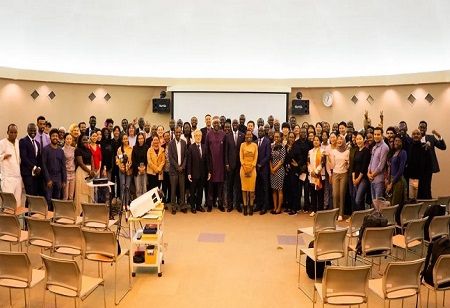Ambassadors and professors from Africa, alongside other participants, have emphasized the necessity of adopting innovative financing approaches and integrating Information and Communication Technology (ICT) into education, drawing inspiration from Japan's experiences. These discussions took place during the inaugural Africa Day Symposium 2024, hosted by the African Community at the International University of Japan (IUJ).
According to an IUJ document detailing some of the symposium's key recommendations, Abdulazeez Idiaro, the President of the IUJ African Community, highlighted the importance of resilient educational systems in achieving the African Union’s Agenda 2063. The symposium was themed: “Educate an African Fit for the 21st Century: Building Resilient Education Systems for Increased Access to Inclusive Lifelong Quality and Relevant Learning in Africa”.
Among the speakers and panelists were notable figures such as Jean Diouf, the Ambassador of Senegal to Japan; Funabashi Gaku, a Professor at the Graduate School of International Management, IUJ; Hiroyoshi Noro, the CEO of Divic Corp; and Genevieve Apalou, the Ambassador of Ghana to Japan, who was represented by Christopher Gaba, the Minister Counsellor (Diaspora, Education, and Culture) at the Embassy of Ghana in Japan, alongside other distinguished individuals.
During his welcoming address, Mr. Idiaro stressed the importance of innovation and adaptability in response to challenges such as the digital divide and insufficient infrastructure, particularly accentuated by the COVID-19 pandemic. The president of IUJ further emphasized the dedication to improving digital infrastructure and promoting collaborations between the public and private sectors to establish inclusive, fair, and efficient educational frameworks.
During his speech, Hiroshi Kato, the former Vice President of the Japan International Cooperation Agency (JICA) and current Vice President of IUJ, emphasized the crucial role of collaboration between Asia and Africa in shaping a peaceful and prosperous world by the conclusion of the 21st century. Professor Kato highlighted the demographic significance of both continents and emphasized the necessity for cooperation in advancing education and technology.
According to IUJ, the panellists discussed strategies to ensure quality assurance in teacher education, efforts to integrate agriculture education and technology, and effective policies from other regions that could be adapted to improve educational outcomes in Africa. They also explored the shift from traditional educational practices to competency-based education programmes and the importance of lifelong learning and continuous professional development for educators.
The conversation additionally centered on inventive financing frameworks aimed at bolstering educational technology, technological advancements, and policies inspired by Japan, which could augment learning opportunities in Africa. Moreover, they delved into the significance of ed-tech startups, drawing lessons from the worldwide transition to online education prompted by COVID-19, and stressed the crucial aspect of ensuring that technological innovations extend to marginalized communities.
The speakers proposed inventive financing frameworks, highlighting the significance of the African Education Fund (AEF) backed by the African Development Bank to address the shortfall in education funding and improve the effectiveness of education systems. They advocated for substantial investments in digital infrastructure and accessible internet services to surmount obstacles to technology integration. Additionally, they recommended supporting ed-tech startups through financial backing, mentorship, and regulatory structures to catalyze educational reform.
“Developing low-cost, scalable solutions tailored to the needs of marginalized populations and collaborating with NGOs and community organizations for effective implementation”, they noted. They also encouraged collaboration between multilateral agencies, governments, and the private sector to drive educational innovation and development effectively.

